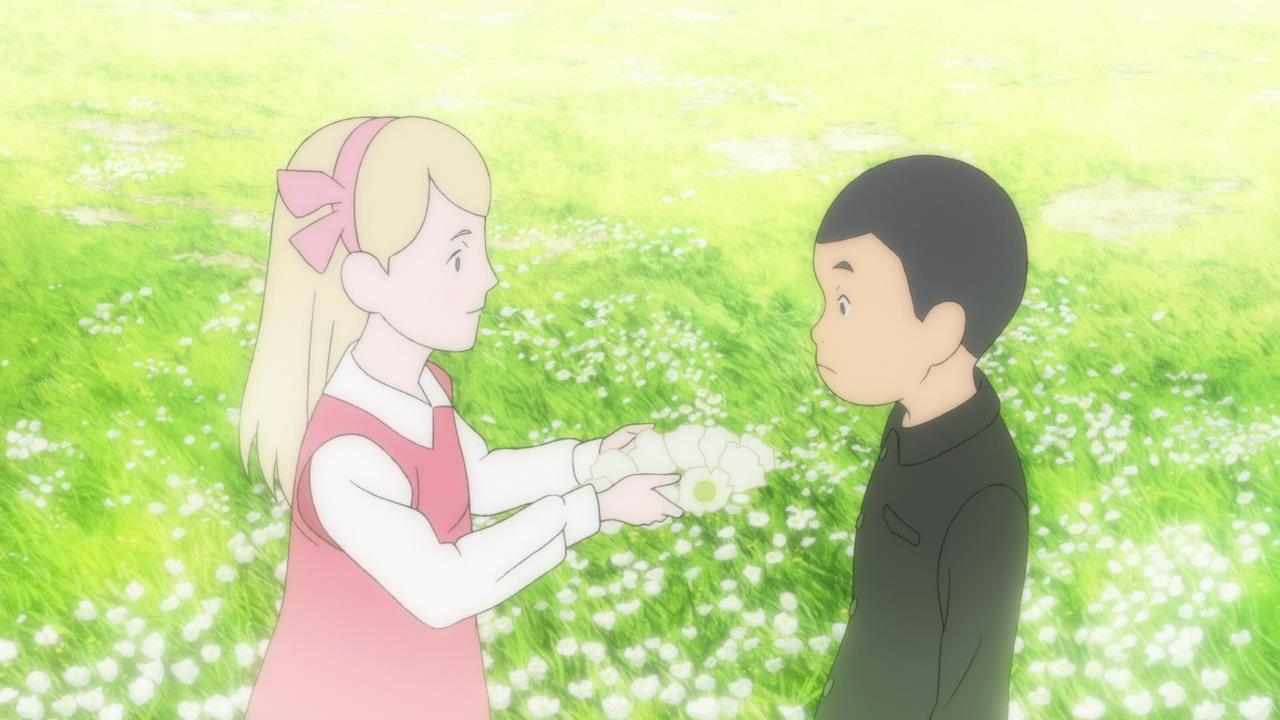By Chlotrudis Independent Film Society
Rating: 4.5 cats
Director: Mizuho Nishikubo
Starring: Junya Taniai | Kota Yokoyama | Masachika Ichimura | Saburo Kitajima | Yukie Nakama

Original language title: Jobanni no shima
Country: japan
Year: 2014
Running time: 102
IMDB: http://www.imdb.com/title/tt3178174/combined
Jason says: “There’s a whiff of nostalgia to the start of GIOVANNI’S ISLAND, although it’s more for childhood in general than the yearning for simpler, presumably better times that can often infect Japanese cinema, but that passes. Indeed, it’s hard not to have GRAVE OF THE FIREFLIES in one’s head at some points during the latter half of this one, though it’s fortunately not anywhere close to as sad as that spirit-crushing masterpiece. What does share with Fireflies is a knack for telling a story from a child’s point if view that would be impressive in live action or animation.
“That story starts on Shikotan, on 4 July 1945. Though many young men have gone off to fight, the war has left this small island north of Hokkaido relatively untouched, with brothers Junpei (voice of Kota Yokoyama) and Kanta (voice of Junya Taniai) Senou continuing to attend class in a one-room schoolhouse under the eye of Miss Sawako (voice of Yukie Nakama). Their father Tatsuo (voice of Masachika Ichimura), who named the boys after characters in Kenji Miyazawa’s book Night on the Galactic Railroad, heads the island guard (pretty much just the fire brigade in practice), and grandfather Genzou (voice of Saburo Kitajima) continues to fish. Their ne’er-do-well uncle Hideo (voice of Yusuke Santamaria) returns right around the time the Soviets land, and while the boys soon find that they share a love of trains with new neighbor Tanya (voice of Polina Ilyushenko), the Soviet commander’s daughter, that transcends the language barrier, it soon becomes clear that the Soviets do not intend this to be a temporary occupation.
“Shikotan remains under Russian control to this day, so there is perhaps some logic and necessity to telling this story from the kids’ point of view – there’s nobody else to talk to who would remember these events. Writers Shigemichi Sugita & Yoshiki Sakurai and director Mizuho Nishikubo craft an interesting tale from these circumstances, one that starts out optimistic – the Japanese and Russian children become close no matter how their parents come into conflict, with a thoroughly charming scene of Tanya and the boys realizing that their model train sets are compatible and literally forming a connection through their walks. There’s still a little edge to it – the scene where Tanya shows her room to Junpei and Kanta without seeming to fully realize that it was theirs before the occupiers took the house is going to feel beautifully ambivalent to adult viewers, though maybe not to the kids, while the scenes where Manta is picking Russian up easily will likely unnerve adults who can conceive of cultural assimilation much more. The film is full of little moments like that, and they make it feel real and lived-in.
“It’s also a fine coming-of-age story, especially as circumstances become darker as months (and years) pass. Junpei and Tanya are getting close to the age where they see each other as more than just friends, but Junpei in particular is starting to understand things – that adults have lives outside of what they do for kids, that even friends may have different loyalties, and that his mother’s death is far from the limits of the world’s potential cruelty. The filmmakers get this across less with narration than shocked pauses and the sudden attacks of panic that come more with maturity than innocent youth. The way Nishikubo and his team present sequences from Night on the Galactic Railroad change not just with the circumstances around the boys as they read it aloud, but as Junpei realizes that it’s not just a simple adventure story.
“Although those fantasy sequences are quite striking, the visual style of the movie is often very simple, with the kids’ faces especially drawn with wide eyes and simple features, often distorting more than you might expect for a relatively serious movie. It’s especially interesting to look at how the animators draw Tanya, who looks cute but a bit distorted, perhaps a bit more so to Western viewers, but probably did seem that way to her Japanese friends. The renderings of the Russian furniture moved into the Japanese home makes them look huge compared to the simple, low-to-the-ground things they replaced, and the whole look of the movie’s background changes when, as history dictates, the scene shifts away from Shikotan.
“I don’t speak either Japanese or Russian, so I can’t say for sure how good the voice acting is, but it sounds right, expressive without seeming exaggerated, especially where the kids are concerned: There’s nothing really babyish about Junya Taniai’s Kanta although there could be, for insurance. Yusuke Santamaria makes Hideo big without making him just comic relief, and Yukie Nakama covers a lot of range as Sawako. I was kind of tickled to see that Tatsuya Nakadai did the voice of the older Junpei in this, although I see that the guy has just never stopped working even though he was a big-deal leading man back in the day.
“Afterwards, I was kind of surprised that some folks brought young kids, and wondered if maybe they were expecting something a little less intense. A little thought has me thinking that it’s not too heavy for them, although I would absolutely recommend it as a family movie. It’s got layers that adults will see that kids don’t – more than enough for grown-ups to be impressed with it on their own, and might bear some discussion afterward. 4.5 cats
“Seen 27 July 2014 in Théâtre Hall (Fantasia Festival: AXIS, DCP)”
